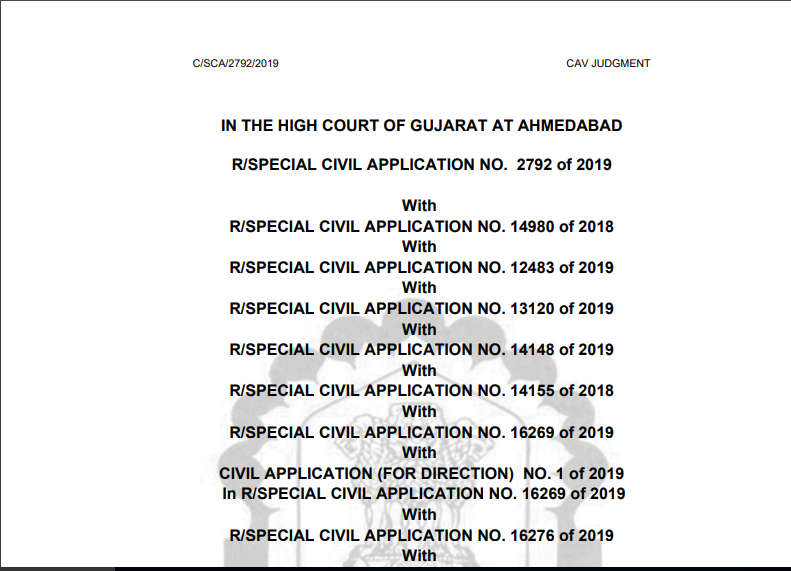Gujarat HC in the case of VKC Footsteps India Pvt. Ltd.
Case Covered:
VKC Footsteps India Pvt. Ltd.
Versus
Union of India
Facts of the Case:
Since these petitions are arising out of the common issue, the same were heard analogously and are being disposed of by this common Judgment.
For the sake of convenience, the Special Civil Application No.2792 of 2019 is treated as the lead matter.
The Petitioner is engaged in the business of manufacture and supply of footwear which attracts Goods and Service Tax (for short the “GST”) at the rate of 5%. The Petitioner procures input services such as job work service, goods transport agency service, etc. and inputs such as synthetic leather, PU Polyol, etc., on payment of applicable GST for use in the course of business and avails input tax credit of the GST paid thereon. The majority of the inputs and input services attract GST at the rate of 12% or 18%. Thus, the GST rate paid by the Petitioner on procurement of input is higher than the rate of tax payable on their outward supply of footwear. Therefore, in spite of the utilization of credit for payment of GST on outward supply, there is an accumulation of unutilized credit in the electronic credit ledger of the Petitioners.
Observations of the Court:
From the conjoint reading of the provisions of Act and Rules, it appears that by prescribing the formula in Sub-rule 5 of Rule 89 of the CGGST Rules,2017 to exclude refund of tax paid on “input service” as part of the refund of the unutilized input tax credit is contrary to the provisions of Sub-section 3 of Section 54 of the CGST Act,2017 which provides for a claim of refund of “any unutilized input tax credit”. The word “Input tax credit” is defined in Section 2(63) means the credit of input tax. The word “input tax” is defined in Section 2(62), whereas the word “input” is defined in Section 2(59) means any goods other than capital goods and “input service” as per Section 2(60) means any service used or intended to be used by a supplier. Whereas “input tax” as defined in section 2(62) means the tax charged on any supply of goods or services or both made to any registered person. Thus “input” and “input service” are both part of the “input tax” and “input tax credit”. Therefore, as per provision of sub-section 3 of Section 54 of the CGST Act,2017, the legislature has provided that registered person may claim a refund of “any unutilized input tax”, therefore, by way of Rule 89(5)of the CGST Rules,2017, such claim of the refund cannot be restricted only to “input” excluding the “input services” from the purview of “Input tax credit”. Moreover, clause (ii) of the proviso to Sub-section 3 of Section 54 also refers to both supply of goods or services and not the only supply of goods as per amended Rule 89(5) of the CGST, Rules 2017.
In view of the above analysis of the provisions of the Act and Rules keeping in mind scheme and object of the CGST Act, the intent of the Government by framing the Rule restricting the statutory provision cannot be the intent of the law as interpreted in the Circular No.79/53/2018- GST dated 31.12.2018 to deny the registered person refund of tax paid on “input services’ as part of a refund of any unutilised input tax credit.
We are of the opinion that Explanation (a) to Rule 89(5) which denies the refund of “unutilized input tax” paid on “input services” as part of “input tax credit” accumulated on account of inverted duty structure is ultra vires the provision of Section 54(3) of the CGST Act, 2017.
The judgement of the Court:
The respondents are, therefore, directed to allow the claim of the refund made by the petitioners considering the unutilized input tax credit of “input services” as part of the “net input tax credit”(Net ITC) for the purpose of calculation of the refund of the claim as per Rule 89(5) of the CGST Rules,2017 for claiming refund under Sub-section 3 of Section 54 CGST Act,2017.
As a result, for the foregoing reasons, the petitions are accordingly allowed. The rule is made absolute to the aforesaid extent. No order as to costs.
Further Order:
After the judgment is pronounced, Mr. Nirzar Desai learned Standing Counsel for the respondent made a request to stay the operation, implementation, and execution of the judgment.
Having regard to what has been stated in the judgment and more, particularly, when Explanation(a) to Rule 89(5) of the CGST Rules, 2017 is held to be ultra vires the provisions of subsection(3) of section 54 of the CGST Act, 2017, request of the learned advocate is rejected.
Read & Download the Full Decision in pdf:
If you already have a premium membership, Sign In.
 ConsultEase Administrator
ConsultEase Administrator
Consultant
Faridabad, India
As a Consultease Administrator, I'm responsible for the smooth administration of our portal. Reach out to me in case you need help.













